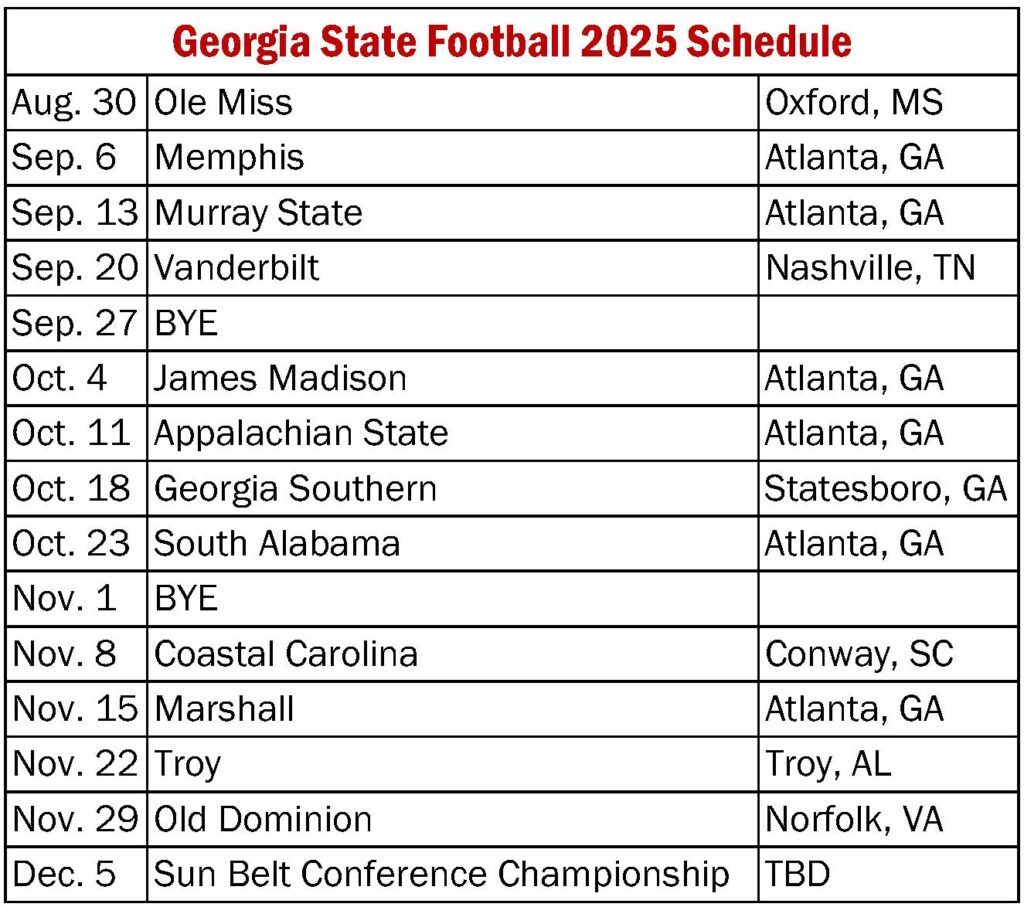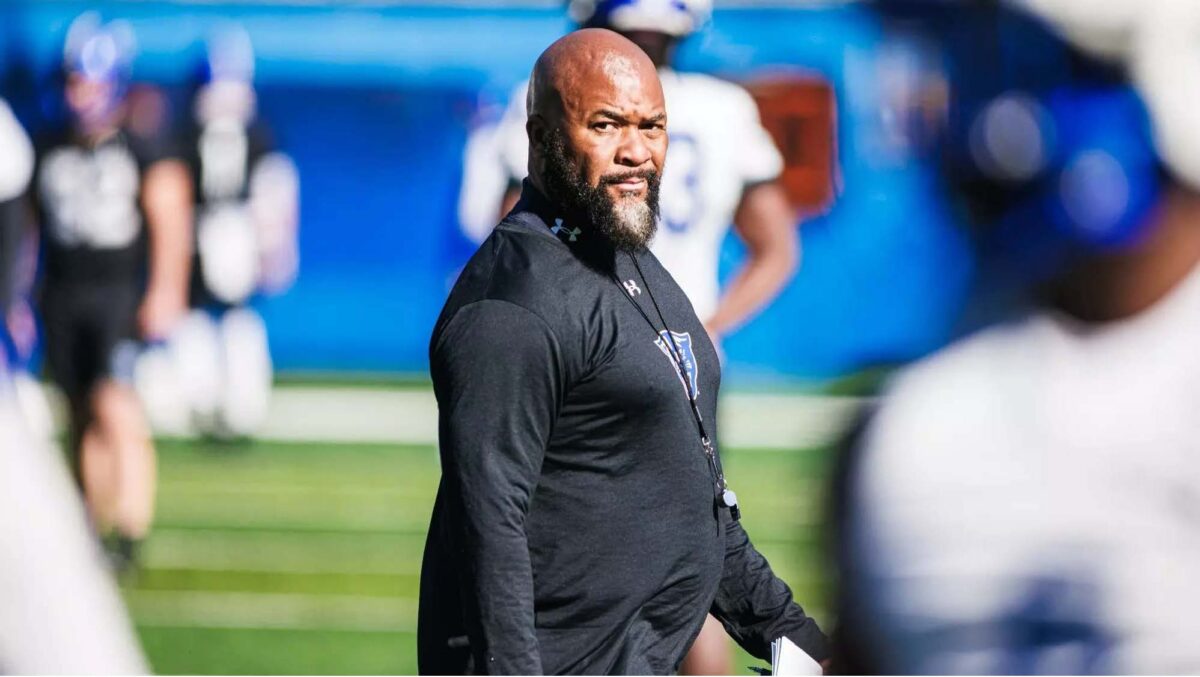Blog Article
Dell McGee’s Georgia State Football Nightmare Is Just Beginning
Dell McGee’s first season at Georgia State ended exactly how everyone feared it would.
The former Georgia running backs coach—who helped develop Nick Chubb, Sony Michel, and D’Andre Swift into NFL stars—managed just 3 wins in 12 games. His hot seat rating of .702 against weak competition tells the brutal truth: even lowered expectations proved too high.
But the real nightmare isn’t what happened in 2024.
It’s what’s coming in 2025.
The 3-9 Disaster That Nobody Saw Coming (Except Everyone Did)
McGee inherited a Georgia State program that won 7 games and a bowl in 2023 under Shawn Elliott.
Twelve months later, the Panthers managed wins against:
- Chattanooga (24-21)
- Vanderbilt (36-32)
- Texas State (52-44)
That’s it.
The offensive numbers expose the systematic failure. Georgia State averaged 23.7 points per game—exactly matching the 23.7 points they surrendered on defense. This wasn’t a team learning a new system. This was a program drowning in mediocrity.
The tale of two seasons lived within individual games.
In victories, McGee’s offense exploded for 440.3 yards per game with 176.3 rushing yards. In losses, those numbers collapsed to 371.9 total yards and a pathetic 118.9 rushing yards per game.
For a coach whose specialty was developing elite ground games, watching his rushing attack average 4.4 yards per carry had to be torture.
The Position Coach Paradox That’s Destroying Everything
Here’s the uncomfortable truth about Dell McGee: his resume creates impossible expectations.
Eight seasons at Georgia. Back-to-back national championships. 56 NFL draft picks developed, including 15 first-rounders. National Recruiter of the Year in 2018.
Yet his Georgia State debut featured:
- A quarterback (Christian Veilleux) with 11 interceptions against 13 touchdowns
- A defense surrendering 6.2 yards per play
- A rushing offense that managed just 133.3 yards per game
The cruelest reality in college football is that excellence doesn’t transfer between roles.
McGee spent decades perfecting individual player development. Running backs coach. Recruiting specialist. Position-specific guru.
Head coaching demands something entirely different—program architecture, culture building, staff management, game-day decision making.
The disconnect shows up everywhere. McGee’s Georgia offenses operated with surgical precision. His Georgia State offense completed 60.4% of passes while turning the ball over 1.6 times per game.
The 68-Player Roster Explosion That Could Backfire Spectacularly
McGee’s response to 2024’s failure? Blow up the entire roster.
Georgia State brought in 68 new players for 2025:
- 33 true freshmen
- Multiple FBS transfers
- Power Five running backs Rashod Amos (Ole Miss), Djay Braswell (South Carolina), Branson Robinson (Georgia)
- Wide receiver Leo Blackburn from Georgia Tech
- Four-star defensive tackle Jartavius Flounoy
This represents more than 60% roster turnover—the college football equivalent of burning down the house to kill a spider.
The recruiting class ranks as Georgia State’s best in program history and tops in the Sun Belt according to 247Sports. On paper, it solves every problem that plagued 2024.
But here’s what nobody wants to admit: chemistry matters more than talent.
Team cohesion doesn’t develop overnight. When three-quarters of your roster is new, you’re essentially coaching a completely different team. New problems emerge even as old ones theoretically get solved.
McGee is gambling his career on unproven players developing instant chemistry while learning his system.
The odds are not in his favor.
The Hue Jackson Hire That Should Terrify Georgia State Fans
McGee replaced offensive coordinator Jim Chaney with former NFL head coach Hue Jackson.
On the surface, this looks smart. Jackson brings play-calling experience from both college and professional levels. He should address the offensive inconsistencies that plagued 2024.
But Hue Jackson’s history reveals a pattern of organizational destruction that should keep Georgia State administrators awake at night.
Jackson’s NFL tenure ended with a historically bad 3-36-1 record with Cleveland. Former quarterback Baker Mayfield called Jackson “fake” after he immediately joined division rival Cincinnati following his firing.
The pattern repeats everywhere Jackson coaches:
- NFLs Oakland Raiders fired him in 2011 after he publicly criticized his team and defensive coordinator following a season-ending loss
- The Cleveland Browns fired him after 2.5 seasons of historic futility
- Grambling State fired him after just two seasons amid complaints about “lack of transparency, coordination, and collaboration.”
Jackson’s documented tendency toward organizational undermining creates a ticking time bomb within McGee’s staff.
His X’s and O’s knowledge is legitimate. His ability to function within organizational structures remains questionable.
For a first-time head coach already fighting for credibility, bringing in a coordinator with Jackson’s baggage represents either desperation or poor judgment.
The Schedule From Hell That Will Expose Every Weakness
The 2025 schedule offers zero mercy for a program attempting massive reconstruction.
Non-conference games include:
- At Ole Miss (August 30)
- Memphis (September 6)
- At Vanderbilt (September 20)
These aren’t tune-up games—they’re potential blowouts that could destroy confidence before Sun Belt play begins.

The conference schedule presents additional nightmares. James Madison, Appalachian State, and Georgia Southern all possess the talent to embarrass Georgia State if the roster overhaul fails to gel quickly.
McGee’s 1-7 Sun Belt record in 2024 demands immediate improvement. The roster upheaval creates uncertainty about whether improvement is even possible.
Bowl eligibility requires six wins. Based on the current trajectory, that target appears optimistic rather than achievable.
The Hot Seat Mathematics That Don’t Add Up
Dell McGee’s .702 Hot Seat Rating reflects a harsh reality: even modest expectations exceeded actual performance.
The “weak competition” qualifier stings because it suggests Georgia State couldn’t meet diminished standards. When your floor becomes your ceiling, the trajectory points in only one direction.
The financial commitment suggests institutional patience, but college football rarely affords extended timelines.
McGee signed a five-year deal worth approximately $850,000 annually. That investment should provide job security.
But Georgia State’s overall program record of 54-92 across 12 seasons creates fan apathy that demands a dramatic reversal rather than gradual improvement.
Year two becomes crucial for demonstrating that 2024’s struggles represented growing pains rather than fundamental limitations.
The Uncomfortable Truth Nobody Wants to Acknowledge
McGee’s situation exposes college football’s cruelest contradiction.
Fans and administrators expect immediate improvement while simultaneously understanding that roster reconstruction takes time. This creates impossible expectations that doom coaches before systems fully develop.
The hot seat rating reflects broader impatience with Georgia State football’s entire existence.
The program has never achieved sustained success. Four different head coaches. Multiple conference changes. A fanbase that’s watched 12 years of mostly mediocre football.
McGee inherited not just personnel problems but cultural ones. He needs to simultaneously rebuild the roster and manage expectations in a market that’s already given up on the program.
Success in 2025 depends less on McGee’s coaching ability than on his capacity to manage a program undergoing complete identity transformation.
The massive roster turnover represents both opportunity and vulnerability. Potential solutions that could easily become new problems if chemistry and execution falter.
Dell McGee’s future hinges on proving that elite position coaching translates to program leadership.
The early evidence remains incomplete, but the hot seat temperature continues rising with each passing month.
Year two will determine whether Dell McGee represents Georgia State’s future or merely another transition point in the program’s ongoing search for something it has never actually achieved: sustained success.
The nightmare is just beginning.
